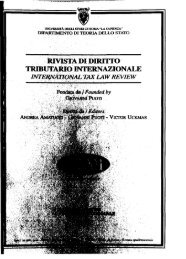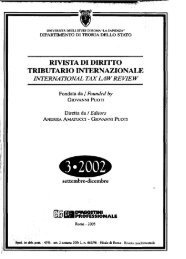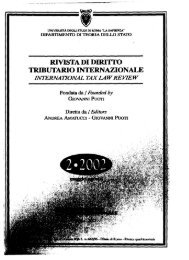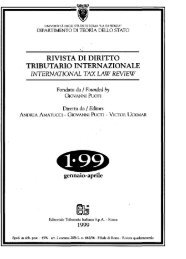RIVISTA DI DIRITTO TRIBUTARIO INTERNAZIONALE - Rdti.it
RIVISTA DI DIRITTO TRIBUTARIO INTERNAZIONALE - Rdti.it
RIVISTA DI DIRITTO TRIBUTARIO INTERNAZIONALE - Rdti.it
Create successful ePaper yourself
Turn your PDF publications into a flip-book with our unique Google optimized e-Paper software.
Sezione I - Dottrina<br />
sidering the minimum requis<strong>it</strong>e for punishabil<strong>it</strong>y to be cognizabil<strong>it</strong>y when<br />
the lalter is not assured due to defects in the law considered as a whole, or<br />
of individuai provision, the offence is not to be considered punishable (23).<br />
Art. 11 thus assumes, employing a somewhat anomalous technique, a formula<br />
usually set in the context of a dispensing circumstance: as things<br />
stand, accordingly, the existence of "objective cond<strong>it</strong>ions of uncertainty"<br />
will give the taxpayer both the right to non-applicate the penalties and the<br />
right to present a request for clarification to the Financial Administration.<br />
The implementation regulations for interpellation have specified that:<br />
"objective cond<strong>it</strong>ions of uncertainty do not exist when the Financial Administration<br />
has fully provided the solution for concrete cases corresponding<br />
to the one described by the taxpayer, in a circular, resolution,<br />
instruction or note, made knowable to the taxpayer through publication<br />
on the Internai Revenue Department's "fiscal documentation" s<strong>it</strong>e.<br />
W<strong>it</strong>h specific reference to interpellation, an objective cond<strong>it</strong>ion of uncertainty<br />
is not deemed to exist when the Administration has already stated<br />
<strong>it</strong>s pos<strong>it</strong>ion, independently of any contrasting views existing in legai<br />
doctrine or jurisprudence in relation to provisions considered equivocaI<br />
and obscure: in this case, the objective characterising the case in question,<br />
i.e. the cognizabil<strong>it</strong>y of the ministerial intepretation, has already<br />
been obtained (24). : 26:<br />
Administration and jurisprudential indications; jurisprudentiai preccdents pronounced<br />
in favour of the taxpayer; author<strong>it</strong>ative doctrinai opinions".<br />
(23) Art. 8, Legis. Decr. 546/92: "The tax disputes board declares :h;1t the non-penaI<br />
penalties foreseen by the fiscai laws are not applicabie when the vioiation is justified<br />
by objective cond<strong>it</strong>ions of uncertainty as to the scope and range of application<br />
of the provisions to which <strong>it</strong> refers"; Art. 6, para 2, Legis. Decr: 472/97 :" the perpetrator<br />
of the vioiation is not punishable \vhen <strong>it</strong> is due to objective cond<strong>it</strong>ions of uncertainty<br />
as to the scope and range of application of the provisions to which they refer,<br />
and also to vagueness of the requests for infonnation or the tax return and payment<br />
fonns"; Art. 15, Legis. Decr. 74/2000: "Apart from the cases in which punishabil<strong>it</strong>y<br />
is excluded pursuant to Art. 47, paragraph three, of the penai code, \liolations of<br />
fiscal regulations due to objective cond<strong>it</strong>ions of uncertainty as to their scope and range<br />
of application do not give rise to punishable offences for the effects and purposes of<br />
this decree"; Art. lO, paragraph 3, La".,' No. 212/200: "the penalties are in any case not<br />
applied when the vioIation depends on objective cond<strong>it</strong>ions of uncertainty as to the<br />
scope and range of application of the fiscal regulation or when <strong>it</strong> const<strong>it</strong>utes a mere<br />
fonnal transgression w<strong>it</strong>hout any tax debL Vìolations of exclusively fiscal relevance<br />
cannot const<strong>it</strong>ute causes of null<strong>it</strong>y for a contract.".<br />
(24) On this point, see. P. Anello, La. rilevanza del concetto di obiettive condizioni<br />
di incertezza dell'interpello, in Corr. trib., 29/2001. p. 2170, who remarks, in particular,<br />
that: "a possible divergence between the ministerial pos<strong>it</strong>ion and that of jurisprudence<br />
or lega! doctrine on a provision in any way definable as not clear or univoca!, although<br />
<strong>RIVISTA</strong> <strong>DI</strong> <strong>DI</strong>RITTO <strong>TRIBUTARIO</strong> <strong>INTERNAZIONALE</strong> 312001






